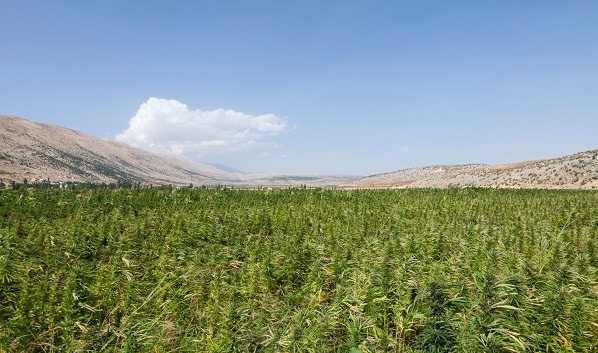DEA Clarifies Nexus Between Cannabinoids, Controlled Substances
The presence of cannabinoids, DEA stated in a directive published in late spring, does not necessarily render a material a controlled substance. The directive was part of many actions the DEA agreed to take as part of a settlement to resolve a lawsuit, according to the Hemp Industries Association.

An internal directive published in late spring by the Drug Enforcement Administration (DEA) further restrains the government agency from unlawful attempts to regulate foods as Schedule I drugs, according to the Hemp Industries Association (HIA).
The presence of cannabinoids, DEA stated in the directive, does not necessarily render a material a controlled substance. The issue, the agency explained, is whether the substance falls within the definition of marijuana under the Controlled Substances Act (CSA).
“Products and materials that are made from the cannabis plant and which fall outside the CSA definition of marijuana (such as sterilized seeds, oil or cake made from the seeds, and mature stalks) are not controlled under the CSA,” DEA stated in the directive. “Such products may accordingly be sold and otherwise distributed throughout the United States without restriction under the CSA or its implementing regulations.”
Brandon Beatty, founder and CEO of Bluebird Botanicals, a marketer of hemp-based products including extracts containing cannabidiol (CBD), said the directive was clearly intended for U.S. Customs and Border Protection (CBP).
In the directive, DEA noted any product that CBP determines was made from cannabis but falls outside the definition of marijuana may be imported into the United States without restriction. Exports should be treated likewise, so long as it is lawful to import the products under the laws of the country destined to receive them.
Beatty said the cake, oil and seeds of cannabis have always been exempt from marijuana. He interpreted DEA’s language as providing just an example of circumstances in which cannabinoids are exempt from the CSA. He and others in the hemp industry have proclaimed their sales of CBD, for example, are authorized under Section 7606 of the 2014 farm bill.
“We’re basically one step away at this point from the DEA explicitly saying, ‘Yes, the [2014] farm bill is another example of cannabis or a potential CBD source that is in fact exempt from the CSA,” Beatty said in an interview. “I feel like [the DEA is] very much agreeing with us without explicitly acknowledging our farm bill industry.”
In a June 8 press release, HIA announced a settlement it reached with DEA that required the agency “to take several actions,” including issuing an internal and external directive to federal agencies under language agreed to by the parties.
HIA filed a motion in 2017 to hold DEA in contempt for violating a 2004 court injunction. The 2004 court order, the trade group said at the time of the lawsuit, barred DEA from regulating hemp foods as Schedule I controlled substances.
“This [DEA] directive should provide clarity to federal agencies and minimize interference with the expanding flow of hemp commerce,” HIA asserted in its recent press release.
In the release, leaders of HIA proclaimed, “This is a great victory for HIA’s membership and the hemp industries due to multiple unfortunate accounts from our members citing DEA’s misguidance to U.S. Customs involving the transportation of lawful hemp food products.”
A DEA spokesperson did not immediately respond to a request for comment.
DEA Directive—No Impact on Marijuana Extract Drug Code
DEA noted its directive doesn’t impact its previous statements concerning a marijuana extract drug code. In a separate lawsuit filed against DEA in 2017, HIA and others moved to invalidate the agency’s marijuana extract rule. In April, a three-judge panel dismissed the lawsuit.
In a clarification of its new drug marijuana extract code, DEA expressed the view that cannabinoids like CBD are found in parts of the plant subject to the CSA, such as the flowering tops, leaves and resin. DEA’s rule, and subsequent clarification, represented a blow to marketers of CBD in products like food and dietary supplements.
Referencing “the scientific literature,” DEA concluded “it is not practical to produce extracts that contain more than trace amounts of cannabinoids using only the parts of the cannabis plant that are excluded from the CSA definition of marijuana, such as oil from the seeds.”
The hemp industry has argued that activities lawfully carried out under the 2014 farm bill exempt CBD from the CSA, regardless of where in the plant CBD comes from.
Colorado-based Bluebird uses flowers of the hemp plant—a fact Beatty said his company doesn’t conceal.
The 2014 farm bill, he added, covers “all parts of the plant” so long as the content of THC—the psychoactive compound found in marijuana—doesn’t exceed 0.3 percent.
In an amicus brief supporting HIA in its lawsuit challenging DEA’s marijuana extract rule, several members of Congress who crafted Section 7606 agreed with Beatty’s assessment.
“In defense of its action, the DEA has asserted that all cannabinoids are controlled substances by virtue of the fact that they are concentrated in the flower of cannabis plants,” the lawmakers wrote. “This argument may have had merit prior to the farm bill, but it is blatantly contrary to the text of the farm bill, which explicitly exempted all parts of industrial hemp, including its flower, from the definition of marijuana.”
In dismissing HIA’s lawsuit, the Ninth Circuit did not examine the specific issue above or the scope of the farm bill, such as whether it authorized full-fledged commercial activities. However, the panel of judges confirmed the farm bill “contemplates potential conflict between the Controlled Substances Act and preempts it.”
About the Author(s)
You May Also Like






.png?width=800&auto=webp&quality=80&disable=upscale)